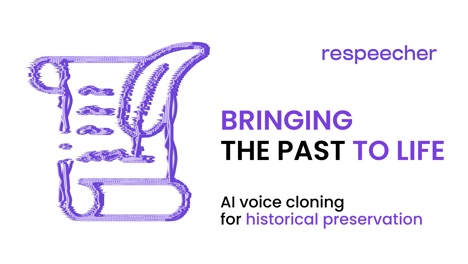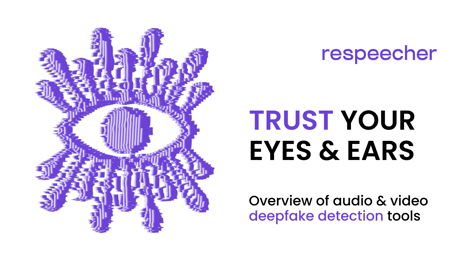Respeecher On the Future of Voice Cloning for Patients with Speech Disabilities at the 2022 MET-TMOHE Joint Conference

Speech is a uniquely human ability that we often take for granted. It allows us to communicate with one another, express emotions, and convey thoughts and ideas. And then one day, it can all be gone.
12,470 new cases of laryngeal cancer have been registered in 2022 so far. Most patients will undergo a total laryngectomy (removal of the larynx). But the impairments resulting from the removal of such a small organ are severe. People lose their voice and speech, endure altered respiration, and have a diminished sense of taste and smell.
At Sempre 2022, Respeecher demonstrated how voice cloning can change the life of patients with speech disabilities and restore a sense of normalcy. Thanks to the electrolarynx, patients can get part of their voice back. The only drawback is that speech generated by an electrolarynx sounds "robotic". Voice banking technology is being explored as a potential solution to this issue.
Respeecher’s voice cloning algorithms can transform such an unnatural sound of an electrolarynx into more articulated and clearer audio. This improvement transforms significantly the patients' lives allowing them to better communicate online, all while upholding principles of AI ethics.
“The commitment of Respeecher’s highly specialized and professional team makes them a pleasure to work with. In almost no time at all, we were able to produce promising results that we could present at the international SEMPRE conference. We are now exploring different ways to achieve more meaningful and life-changing impacts for the laryngectomy community and those who cannot use their voice box, by providing them with much-needed support for communicating.”
As technologies, healthcare, and science is evolving at a blistering pace, restoring someone’s lost voice is no longer fiction. It’s a reality. With Respeecher speech synthesis technology, patients can get their voices, vocal quality, signature tone, and cadence, fully restored.
There can be many reasons for someone not being able to use their voice — disability, trauma, or any number of health conditions. Our AI-powered algorithms can now recreate lost or ailing voices for anyone. People who are no longer able to communicate and share emotions using their voice can now do it with Respeecher AI voice technology.
You can see our first trials of realtime conversions with Sara on the min 05:04.
Speech synthesis is already here and allows individuals to communicate even after they’ve lost their ability to speak, thanks to advancements in voice banking and ethical voice cloning technology. Today, Respeecher can help people with severe speech disabilities like Lou Gehrig’s disease, laryngectomy, progressive muscular atrophy, and others, through ethical voice cloning. Now that the future has arrived with voice generation and restoration, people will soon have access to a voice synthesizer controlled by their brain. But we’ll discuss that at another conference sometime this decade.
FAQ
Ethical voice cloning technology focuses on using AI voice restoration techniques that adhere to AI ethics to create accurate, natural-sounding voice recreations for individuals with speech disabilities. It ensures that voice cloning respects personal consent and privacy while promoting positive impacts in healthcare.
Voice banking allows laryngectomy patients to store their voices before surgery, creating a personalized voice model. This model can later be used with Respeecher speech synthesis to recreate their original voice, helping patients regain speech and communication abilities post-surgery.
Respeecher’s AI voice restoration can assist with conditions like laryngectomy, Lou Gehrig’s disease (ALS), progressive muscular atrophy, and other speech disabilities, providing patients with restored, natural-sounding voices using AI-powered voice recreation and ethical voice cloning technology.
Respeecher’s AI-powered voice restoration technology enhances electrolarynx sounds by converting their robotic tone into clearer, more natural speech. This improvement allows laryngectomy patients to communicate more effectively, making their speech more understandable and emotionally expressive.
Future advancements in AI speech synthesis aim to provide even more personalized and lifelike voice recreations. This includes brain-controlled voice synthesizers and more sophisticated methods for treating speech disabilities, allowing individuals to regain their voices with unprecedented accuracy and ease.
Glossary
Ethical voice cloning technology
Ethical voice cloning technology uses AI voice restoration to recreate natural-sounding speech for individuals with speech disabilities, ensuring privacy, consent, and AI-powered voice recreation.
Voice banking
Voice banking allows laryngectomy patients to store their voice for future use, enabling AI-powered voice recreation with ethical voice cloning technology and speech synthesis.
Electrolarynx enhancement
Electrolarynx enhancement improves electrolarynx sound with AI-powered voice restoration, using ethical voice cloning technology and speech synthesis for better communication.
AI voice restoration
AI voice restoration uses ethical voice cloning technology and AI-powered voice recreation to help laryngectomy patients regain clear speech through Respeecher speech synthesis.
Speech disability solutions
Speech disability solutions with AI-powered voice recreation and Respeecher speech synthesis offer ethical voice cloning technology and assistive voice synthesis for improved communication.

- voice synthesis
- voice cloning
- artificial intelligence
- AI voice synthesis
- synthetic speech
- artificial intelligence (AI)
- synthetic voice
- speech-to-speech (STS) voice synthesis
- voice synthesizing technology
- synthetic voices
- voice cloning technology,
- dubbing technology
- speech synthesis
- AI voice
- speech-to-speech voice conversion
- ethical voice cloning
- AI voices
- Voices
- Sounds
- voice conversion technology
- Respeecher
- voice cloning speech synthesis
- voice cloning solutions
- Speech
- Laryngectomy
- speech disabilities
- voice synthesizer
- Respeecher’s voice cloning algorithms
- Healthcare
- AI-powered algorithms
- voice banking
- AI Ethics
- Respeecher for Business





